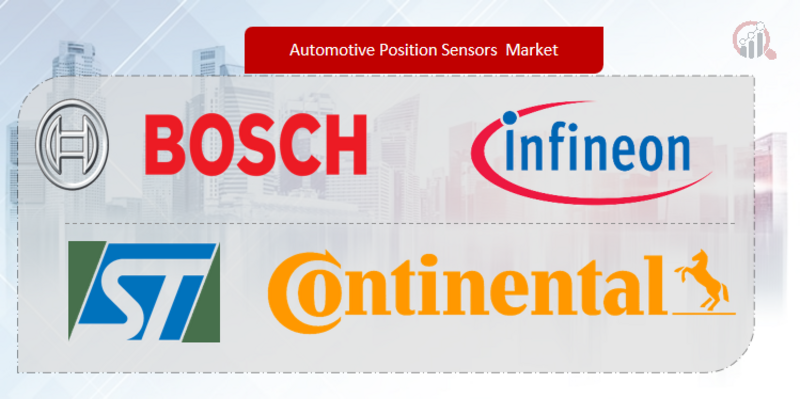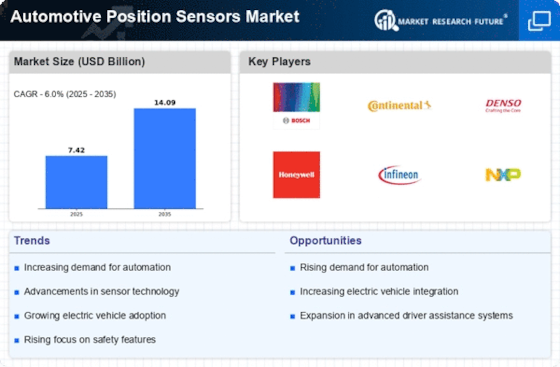Top Industry Leaders in the Automotive Position Sensors Market

*Disclaimer: List of key companies in no particular order
The automotive position sensors market is on the brink of significant expansion, propelled by the escalating demand for advanced driver-assistance systems (ADAS), autonomous vehicles, and electric vehicles. Within this dynamic environment, a multifaceted power struggle unfolds among various stakeholders, each striving to secure a more substantial market share.
Key Players and Strategies:
Tier-1 Suppliers: Dominant entities such as Bosch, Continental, Denso, and Delphi Automotive wield substantial market influence through well-established relationships with Original Equipment Manufacturers (OEMs) and diverse product portfolios. Their strategies revolve around technological advancements, the integration of multiple sensors, and cost optimization through the advantages of economies of scale.
Sensor Specialists: Companies like NXP Semiconductors, TE Connectivity, and Analog Devices carve out niches by specializing in specific sensor technologies, such as magnetoresistive, capacitive, and optical sensors. Their emphasis lies in research and development, offering high-precision and customized solutions for demanding applications.
Emerging Players: Disruptors like AEye and Quanergy are making waves in the market with innovative technologies like LiDAR and solid-state radar sensors. Their primary focus is on providing solutions for autonomous driving applications, often through partnerships with established players or by targeting specific market segments.
Factors for Market Share Analysis:
-
Product Portfolio: Offering a diverse range of sensors for various applications, including steering angle, throttle position, pedal position, and seat adjustment, serves as a competitive advantage.
-
Technological Innovation: Companies leading the way in sensor miniaturization, enhanced accuracy, and lower power consumption are more likely to secure significant OEM contracts.
-
Cost-Effectiveness: Providing robust and reliable sensors at competitive prices is crucial for gaining traction in both OEM and aftermarket segments.
-
Regional Presence: Establishing strong footholds in key automotive manufacturing regions like Asia, Europe, and North America is essential for achieving global market dominance.
-
Strategic Partnerships and Collaborations: Collaborating with OEMs, Tier-1 suppliers, and technology providers facilitates faster development cycles and broader market reach.
Emerging Trends and Company Strategies:
Sensor Fusion: The integration of multiple sensor types – cameras, radar, LiDAR – into comprehensive perception systems is a key trend. Companies like Bosch and NXP are actively developing sensor fusion algorithms for ADAS and autonomous driving applications.
Miniaturization and Integration: Reducing sensor size and weight while enhancing functionality is crucial for space-constrained applications in electric vehicles. Companies like TE Connectivity are concentrating on miniaturized and integrated sensor modules.
Cybersecurity: With increased vehicle connectivity, safeguarding sensor data from cyberattacks is paramount. Companies like Delphi Automotive are investing in cybersecurity solutions for sensor communication and data processing.
Sustainability: Utilizing sensors for energy management and optimizing vehicle performance for fuel efficiency is gaining traction. Companies like Analog Devices are developing low-power and energy-efficient sensor solutions.
Overall Competitive Scenario:
Continuous innovation, strategic partnerships, and adaptation to emerging trends will be key differentiators for success. While Tier-1 suppliers are likely to maintain their dominance, niche players and innovative startups have the potential to carve out significant spaces in the market by offering specialized solutions and capitalizing on new technologies. Ultimately, companies demonstrating agility, technological prowess, and a deep understanding of evolving customer needs will stand to gain the most in this dynamic and rapidly growing market.
Industry Developments and Latest Updates:
Robert Bosch GmbH:
- On October 26, 2023, Bosch announced a new MEMS (Micro-Electro-Mechanical Systems) accelerometer with improved accuracy and stability for vehicle dynamics applications, specifically for advanced driver-assistance systems (ADAS) and autonomous driving. (Source: Bosch press release)
Infineon Technologies AG:
- On December 12, 2023, Infineon released a new family of radar sensors designed for automotive applications, including parking sensors and blind-spot detection systems. These sensors offer improved range and resolution compared to previous generations. (Source: Infineon press release)
STMicroelectronics:
- On December 5, 2023, STMicroelectronics launched a new automotive-grade pressure sensor tailored for tire pressure monitoring systems (TPMS). This sensor features low power consumption and high accuracy, making it ideal for electric vehicles. (Source: STMicroelectronics press release)
Continental AG:
- On December 19, 2023, Continental showcased its latest LiDAR technology at CES 2024, capable of various position sensing applications in autonomous vehicles. This LiDAR provides high-resolution 3D mapping of the environment. (Source: Continental press release)
Denso Corporation:
- On December 15, 2023, Denso partnered with Veoneer to develop a next-generation LiDAR system for autonomous vehicles. This system features a wider field of view and improved resolution for enhanced perception of surroundings. (Source: Denso press release)
Top Companies in the Automotive Position Sensors Industry include:
- Robert Bosch GmbH (Gerlingen, Germany)
- Infineon Technologies AG (Neubiberg, Germany)
- STMicroelectronics (Geneva, Switzerland)
- Continental AG (Hanover, Germany)
- Denso Corporation (Kariya, Japan)
- NXP Semiconductors (Eindhoven, Netherlands)
- Texas Instruments Incorporated (Dallas, U.S.)
- Allegro Microsystems, LLC (New Hampshire, U.S.)
- CTS Corporation (Illinois, U.S.), and others.










